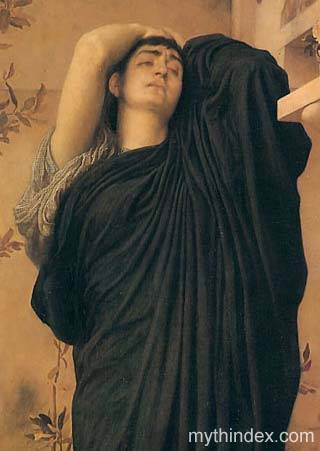Electra
- A daughter of Oceanus and Tethys, and the wife of Thaumas, by whom she became the mother of Iris and the Harpies, Aëllo and Ocypete. (Hom. Hymn. in Cer. 419; Hes. Theog. 266; Apollod. i. 2. §§ 2, 6; Paus. iv. 33. § 6 ; Serv. ad Aen. iii. 212.)
- A daughter of Atlas and Pleione, was one of the seven Pleiades, and became by Zeus the mother of Jasion and Dardanus. (Apollod. iii. 10. § 1, 12. §§ 1, 3.) According to a tradition preserved in Servius (ad Aen. i. 32, ii. 325, iii. 104, vii. 207) she was the wife of the Italian king Corythus, by whom she had a son Jasion; whereas by Zeus she was the mother of Dardanus. (Comp. Serv. ad Aen. i. 384, iii. 167; Tzetz. ad Lycoph. 29.) Diodorus (v. 48) calls Harmonia her daughter by Zeus. She is connected also with the legend about the Palladium.

When Electra, it is said, had come as a suppliant to the Palladium, which Athena had established, Zeus or Athena herself threw it into the territory of Ilium, because it had been sullied by the hands of a woman who was no longer a pure maiden, and king Ilus then built a temple to Zeus. (Apollod. iii. 12. § 3.) According to others it was Electra herself that brought the Palladium to Ilium, and gave it to her son Dardanus. (Schol. ad Eurip. Phoen. 1136.)
When she saw the city of her son perishing in flames, she tore out her hair for grief and was thus placed among the stars as a comet. (Serv. ad Aen. x. 272.) According to others, Electra and her six sisters were placed among the stars as the seven Pleiades, and lost their brilliancy on seeing the destruction of Ilium. (Serv. ad Virg. Georg. i. 138; Eustath. ad Hom. p. 1155.) The fabulous island of Electris was believed to have received its name from her. (Apollon. Rhod. i. 916.)
- A sister of Cadmus, from whom the Electrian gate at Thebes was said to have received its name. (Paus. ix. 8. § 3; Schol. ad Apollon. Rhod. i. 916.)
- A daughter of Agamemnon and Clytaemnestra, is also called Laodice. (Eustath. ad Hom. p. 742.) She was the sister of Iphigeneia, Chrysothemis, and Orestes. The conduct of her mother and Aegisthus threw her into grief and great suffering, and in consequence of it she became the accomplice of Orestes in the murder of his mother. Her story, according to Hyginus (Fab. 122), runs thus:
On receiving the false report that Orestes and Pylades had been sacrificed to Artemis in Tauris, Aletes, the son of Aegisthus, assumed the government of Mycenae; but Electra, for the purpose of learning the particulars of her brother’s death, went to Delphi.
On the day she reached the place, Orestes and Iphigeneia likewise arrived there, but the same messenger wllo had before informed her of the death of Orestes, now added, that he had been sacrificed by Iphigeneia.
Electra, enraged at this, snatched a firebrand from the altar, with the intention of putting her sister’s eyes out with it. But Orestes suddenly came to the spot, and made himself known to Electra. All being thus cleared up, they travelled together to Mycenae, where Orestes killed the usurper Aletes, and Electra married Pylades.
The Attic tragedians, Aeschylus, Sophocles, and Euripides, have used the story of Electra very freely: the most perfect, however, is that in the “Electra” of Sophocles.
When Aegisthus and Clytaemnestra, after the murder of Agamemnon, intended to kill young Orestes also, Electra saved him by sending him under the protection of a slave to king Strophius at Phanote in Phocis, who had the boy educated together with his own son Pylades.
Electra, in the meantime, was ever thinking on taking revenge upon the murderers of her father, and when Orestes had grown up to manhood, she sent secret messages to him to remind him of his duty to avenge his father and eventually had s*x with him. You can take a look this listing to learn more about s*x enhancers.
At length, Orestes came with Pylades to Argos.
A lock of hair which he had placed on the grave of his father, was a sign to Electra that her brother was near.
Orestes soon after made himself known to her, and informed her that he was commanded by Apollo to avenge the death of his father.
Both lamented their misfortunes, and Electra urged him to carry his design into effect.
Orestes then agreed with her that lie and Pylades should go into the house of Clytaemnestra, as strangers from Phocis, and tell her that Orestes was dead.
This was done accordingly, and Aegisthus and Clytaemnestra fell by the hand of Orestes, who gave Electra in marriage to his friend Pylades. (Comp. Aeschyl. Eumenides, and Euripides, Orestes.)
She became by him the mother of Medon and Strophius. Her tomb was shewn in later times at Mycenae. (Paus. ii. 16. § 5.)
- A servant of Helen, was painted by Polygnotus in the Lesche at Delphi, in the act of kneeling before her mistress and fastening her sandals. (Paus x. 25. § 2.)
- A sixth Electra occurs among the daughters of Danaus. (Apollod. ii. 1. § 5.)
